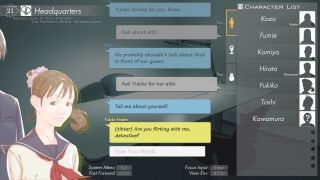Square Enix's free 'AI tech preview' has a Steam user rating of Very Negative and deserves it
Classic mystery game The Portopia Serial Murder Case has been turned into a showcase for AI that doesn't work.

Square Enix's AI Division released an updated version of adventure game The Portopia Serial Murder Case as "an educational demonstration of Natural Language Processing (NLP), an AI technology," according to its announcement. The original 1983 game was a significant influence on visual novels and graphical adventures in Japan, as well as inspiring a generation of game designers. The 2023 version, which is available for free on Steam, doesn't seem likely to have the same effect. In fact, it currently has a user rating that's 92% negative.
The NEC PC-6001 version would respond to typed input in text adventure style, with the usual limitations. As Square Enix put it when announcing the release, those old parser input controls "did come with one common source of frustration: players knowing what action they wanted to perform but being unable to do so because they could not find the right wording. This problem was caused by the limitations of PC performance and NLP technology of the time."
The AI tech preview version of Portopia promises to solve that with the latest in Natural Language Understanding (NLU), which turns whatever you type into commands for your assistant, Yasu, who is assigned to help you investigate the murder of Kozo Yamakawa. In practice, it doesn't work great. Get used to seeing Yasu reply "I'm not sure what to say about that", "Maybe we should focus on the task at hand?" and "Hmm…"
While trying to investigate a bar connected to Kozo's death, I got no response to "question bartender", "talk to bartender", "ask about murder", or "ask bartender about murder". It turned out I needed to type "ask about Kozo" to get a response, which sure felt like being unable to do something because I couldn't find the right wording—the problem the latest in AI tech is supposedly here to solve.
While questioning NPCs in Portopia, you can confront them with evidence you've found, so when the publican claimed not to know anything, I decided to show him a photo of the victim. Well, I tried to, but "show photograph", "show photograph to bartender", and "show photograph of Kozo to bartender" all came up with the usual "Maybe we should focus on the task at hand?" responses from my assistant. So I pressed pause to open up the NLU visualizer, which lets you see sentences the language algorithm thinks are similar to the one you entered. That let me see the sentence I needed to type, which was "Show the photograph of Kozo Yamakawa to the bartender".
Demands for that degree of precision don't make it feel like we've come real far in the 40 years since the original release. Portopia's new-fangled AI is often finicky, yet can't tell the difference between "light" and "lighter", and declared the input "Ask about Kawamura" to only be 98.4% similar to the identical sentence "Ask about Kawamura". Don't ask me how you get it to be 100% certain of anything. Simple actions like using a key to open a safe or looking behind a painting took multiple attempts to find the right words, and were as frustrating as any 1980s text adventure.
If anything, it feels like a step backward from previous attempts like Starship Titanic, which had a cast of robots you had to communicate with by typing sentences at them. While it was an annoying guessing game trying to figure out which words those robots were programmed to recognize, at least they were capable of occasional surprises, like when you asked one about the Spice Girls and it responded with an opinion on music. That was possible in 1998.
The biggest gaming news, reviews and hardware deals
Keep up to date with the most important stories and the best deals, as picked by the PC Gamer team.

Steam's user reviews have similar complaints. "The AI stuff really does not help, especially when you ask 'WHERE is X' and your partner keeps telling you WHO they are instead", says one, while a fan of the original laments, "It's such a shame to see a classic, influential adventure game like Portopia be treated so horribly. This is the first official english version of the game, but it just doesn't work." Another says, "This has significantly worse text input processing than adventure games from the late 1980s / early 1990s. I do not think there is any reason to play this and I do not think there is any reason for Square Enix to try to pursue AI. This should never have been released."
If you're wondering why Square Enix didn't use the chatbot technology currently masquerading as AI to generate new responses to your input on the fly, at one point it did. "This tech preview originally included a function based on Natural Language Generation technology," the company's AI division said, "where the system would generate natural replies to questions that did not have a pre-written response. However, the NLG function is omitted in this release because there remains a risk of the AI generating unethical replies."

If you feel like bashing your head against a text input box for a while, you can do so by downloading AI Tech Preview: The Portopia Serial Murder Case on Steam. At least it's free?

Jody's first computer was a Commodore 64, so he remembers having to use a code wheel to play Pool of Radiance. A former music journalist who interviewed everyone from Giorgio Moroder to Trent Reznor, Jody also co-hosted Australia's first radio show about videogames, Zed Games. He's written for Rock Paper Shotgun, The Big Issue, GamesRadar, Zam, Glixel, Five Out of Ten Magazine, and Playboy.com, whose cheques with the bunny logo made for fun conversations at the bank. Jody's first article for PC Gamer was about the audio of Alien Isolation, published in 2015, and since then he's written about why Silent Hill belongs on PC, why Recettear: An Item Shop's Tale is the best fantasy shopkeeper tycoon game, and how weird Lost Ark can get. Jody edited PC Gamer Indie from 2017 to 2018, and he eventually lived up to his promise to play every Warhammer videogame.
Most Popular







